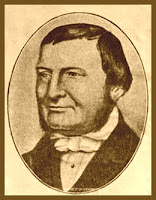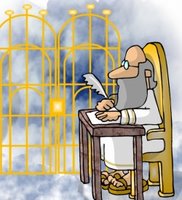Welcome to the Lutheran Carnival of Blogs LIV.
Preface and Introduction
Meet this carnival’s un(der)known Lutheran, the
Reverend August Ludwig Christian Kavel. Somewhat like Walther, Grabau, and others who came to America to avoid possible loss of Lutheran identity, Kavel led a group of confessional Lutherans to Australia because of increasing pressure to accept mandated unionism with the Reformed in Prussia. He was born in Berlin 3 September 3 1798, dying on 12 February 1860 in South Australia. Sources agree that August Kavel is the one person most responsible for an established Lutheran Church in Australia.
While he first investigated leading an immigration to either the United States or Russia, neither move proved feasible. However, Pastor Kavel learned in Hamburg that it might be possible to relocate to Australia. It took perseverance, patience, and the arrest of some of the confessionals before Prussia finally granted them permission to emigrate near the end of 1837.

Sailing on four ships, Kavel’s party included 596 Prussian Lutherans seeking free practice of the Faith in Australia. They left Europe at different times, arriving Down Under in 1838 and 1839. In May of 1839, the elders of three newly founded villages met to establish an Australian Lutheran synod, the first forerunner of the
Lutheran Church of Australia.
Some two and one half years later, an additional 224 “Old Lutherans” from Prussia joined Kavel and the original emigrating Prussians. This later migration was led by Pastor Gotthard Fritzsche.
And now, on with the show.The (Un)Usual Cast of CharactersI’ve listed entries alphabetically by blog name (unless I goofed) rather than by theme. In keeping with a suggestion I made in a call for posts, there are a few entries dealing with vacation, recreation, and leisure — prime activities of our summer months — but I’ve left them scattered amongst the others. Aardvark Alley
Aardvark Alley continued the commemorations, including one of the biggies of the Faith,
The Holy Prophet Isaiah.
The Aardvark also got gastronomical with a brief essay on the differences between
Chili Dogs and Chili Dogs.
Lacking the energy to write in the third person tonight, I’ll simply let you know that here at
Ask the Pastor, I looked back at my ordination in
The Reverend Snyder Turns Fifteen.
In response to a question predicated by a major false teacher, I also wrote
Christian Liberty: What Would Jesus Rebecca Do?Barb the Evil Genius had a particularly
Happy Friday the 13th, since it also meant the celebration of “the last year” of her 30s.
Obviously, Barb’s Friday beat Mutti Beck’s Monday of the same week. Visit
Beckfest to find out why Mutti said,
I Smell Like Chicken Crap.
Browsing through volume 2 of
The Abiding Word, Pastor Alex Klages (
A Beggar at the Table) ran across a relevant bit from over 60 years ago and shared it with us in
A Quote on the Gospel.
In
One Novel Wonders, the Klages family discusses literature, inviting their readers to join in the discourse.
And Now, a Word from Our Founders ... so began
The Black Cloister’s collection of writings from some of the patriots who brought the United States into being and gave the nation its form.
Bloghardt’s Reflector normally provides profound theological images. However, in
We Wii, Pastor Borghardt rhapsodized over the new and very kinetic gaming system.
Joining the Klages in recreational reading,
Blonde Moment also took a look at books — particularly a certain one due to be released later this week.
My Harry Potter Book Seven Picks allows Liz to give her thoughts about tying up the series’ many loose ends with a combination of drama and a satisfied readership.
Pastor Stiegemeyer of
Burr in the Burgh went to the cinema and came back with the seeds of
God in the Ghost Movie, a look at life beyond death the existence and nature of God in the new release
1408.
He also provided one of the better Lutheran looks at Benedict XVI’s new page-turner, answering his own question in
What Did the Pope Say?
Nothing says “vacation in an exotic locale” like writing your post in the language of the land. Chris Pluger of
Café Diem did just this as he asked
¿Qué hiciste durante las vacaciones?After an extended break (can we blame his still new state of wedded bliss?), we’re invited back to
Cantor’s Padded Balcony to examine
Democracy and Faith.
It’s learning and recreation all in one as Emily takes us on
Morning Walks with
The Children of God.
This pairs nicely with Emily’s follow-up post,
Nature Hunt with Kids.
The
Confessing Evangelical took some time off to see the start of that big French bike race (that this year began in England) in
Le Tour de Kent.
What Does an Office Give? So wondered the
Confessional Gadfly, who looked at how being set in office “doesn’t give a person the ability to do something — it provides duties and responsibilities — and the authority to care out those duties and responsibilities rightly.”
Confessional Lutheran Ecclesiastical Art Resources announced that
Lutheran Pictures Font Is Here, pointing out her newly drawn and rendered clipart font now available at
By the Font. This new website developed by Pastor Alex Klages is for lovers of fonts and clip art designs. He and his wife Kelly provide original fonts for free. The first collection available for download is a collection of Lutheran-themed pictures, as you can see from
this PDF. Where else will you find a font that includes drawings of Martin Chemnitz, the Six Chief Parts of the Catechism, and a pastor brandishing a beer stein?
Dr. Veith of
Cranach took a brief but hard look at
Religious Visas and the possible religious discrimination a crackdown on immigration could provoke.
At
Cyberbrethren, Pastor McCain used A Treatise on the Power and Primacy of the Pope in
Refuting the Claims Made by the Bishop of Rome.
Many people in the
LCMS wonder
When to Leave Missouri. Pastor Petersen of
CyberStones makes a short, sweet case for saying, “I am not leaving.”
 No Apologies
No Apologies. Period. L. P. Cruz of
Extra Nos muses about the relative paucity of contemporary Luther apologetics and uses confessional theology, Christology, and a complimentary understanding of the pastoral office in making his points.
Extreme Theology tackled a continuing issue flowing forth from much of Protestantism, posting an
essay written by Pastor Bryan Wolfmueller of Aurora, Colorado,
Decision Theology: Can You Make a Decision for Christ?How about watching a classic Disney movie as a favorite leisure activity? Sure, unless you’re trying to get your hands on
Song of the South. However,
Father Hollywood says that you can find the DVD overseas and opines that it’s worth the effort.
At
A Fort Made of Books, Robbie used the new Potter film as a springboard for introducing
Four Quirky Fantasies.
Robbie then updated a previous post challenging readers untrained in listening to classical music, asking
How is Assignment 1 Going?Has a Roman Catholic ever asked you to pinpoint exactly when the church stopped being “one, holy, catholic, and apostolic”? Weekend Fisher of
Heart, Mind, Soul, and Strength made a history-based case that
It Happened at Chalcedon in AD 451.
Responding to the Bishop of Rome’s recent comments, Weekend Fisher also took a look at the infighting among the disciples following Jesus’ famous, “You are Peter” statement. WF showed how Jesus answered the ensuing question about who is
The Greatest among the Apostles.
Was it vacation, break, or
Hiatus? Whatever ... Rachel Engebretson of
Here I Stand came back to the blog close out her high school memories and start preparing us to read her college blogging in the years to come.
Fr. Chadius of
Hermenia expertly pondered
Christian Catechesis through Water, New Roads, and Infant Baptism.
Involved in Summer Greek at the Seminary, Der Bettler of
Hoc Est Verum ended his own rather brief break and now offers a collection of
Miscellanea for his readers.
Still miss Beggars All? A collection of favorite lay Lutherans, including the core of Beggars, formed a new group blog,
Honoring the Office of the Holy Ministry. Among their recent posts, check out what Tim the Enchanter said about
Secret Ballots and the OHM and learn Erich Heidenreich’s answer to the question,
Is My Pastor Valid and Due the Honor of the OHM? Kelly’s Blog
Kelly’s Blog describes her challenging
Quest for an Aesthetically Pleasing Bible Cover, also providing a number of links to some of the stranger covers you’ll find on the market.
Lutherama discovered the news that “infants as young as six months are capable of lying” and marveled that occasionally,
Science Catches Up with the Bible.
The
Lutheran Hen relaxed on the eve of Independence Day and took stock of the Creation around her, including a most wonderful
Sunset.
The Mrs. of
The Moose Report hasn’t actually begun vacation yet. However, she let us know that she and her husband are certainly
Planning a Road Trip — something that, after six years of marriage, each of them needs with the other.
With
Coptic Christians and FGM, Dan of
Necessary Roughness brings to light a practice normally associated with Islamic regions, female genital mutilation, that he discovered is also practiced among some Coptic Christians in Ethiopia.
Dan also makes the fantastic understatement that
Praying for Conversion is Not a Bad Thing. While Liberal Roman Catholics are up in arms over Good Friday prayers in the Tridentine Mass that call for the conversion of Jews, he argues that such prayers are not evil and racist, but desirable.
Christopher Herren opened Mother Hubbard’s Cupboard and pulled out a plum.
The Rational Response Squad, Christopher Hitchens, and Richard Dawkins looks at a recent Creation vs. evolution debate on Nightline and illustrates some of the ongoing scientific problems for those who make science their god.
Tired of Methobapticostals telling you that your in-the-font infant baptism was “all wet”? Sam of
Nerd Heaven has a good response to those who insist that you must be
Baptized Like Jesus.
Every pastor should read what Paul Siems wrote in
A Tribute Concerning My Wife at
Not Alone.
Pastor Paul Beisel,
One Lutheran ... Ablog™, was also one Lutheran ...
On Vacation!! God Gave Us Pastors
God Gave Us Pastors, says
Presbytera. Too bad some of them turn out like a certain Deliberate Interim Pastor whom she introduces to us. (If you’re a fan of crummy hymnody, you’re in for a special treat.)
At
Putting out the Fire, Frank uses a DC Comics character to explore original sin and the lack of self-knowledge among many evil people as he introduces
Sinestro’s Oath, the Human Condition, and Sin.
What Kind of Woman Does a Pastor Fall in Love With? Spurred by this hit from Google, the
Rebellious Pastor’s Wife answered on behalf of herself and her not available at the time husband — but she’d love to hear from other pastors and their wives, too.
A short vacation is better than no vacation at all. Even a simple
Mom & Dad’s Day Out can go a long way toward recharging a couple’s batteries, according to
A Round Unvarnish’d Tale.
New Pastor Jim Roemke, a.k.a.
St. James the Hoosier, compares feelings and faithfulness as he discusses a common pastoral struggle involving
The Difficulty with Closed Communion.
Lacking God, People Will Try Anything, says
Original Evangelical David Yow in reaction to the mass of people trying to get lucky in love last week by marrying on 7/7/7.
David also presents a new
Hymn Text celebrating Jesus giving us His own body and blood in the Lord’s Supper.
It may not be a vacation trip, but Pastor Schaaf is in the middle of some major traveling
In the Land of Sudan. Catch up with the good pastor at
Schaaf’s Kopf.
What recreational facility might Scott of Schreiben von Schreiber be
In Search Of? How about a summer camp for next year?
Pastor Bryce Wolfmueller of
Theological Inquiries took a different than normal approach to the Lutheran understanding of prayer and unionism in
Multireligious Prayer, drawing much of his material from Pope Benedict XVI’s recent
Truth and Tolerance. (Note: This entry was originally “lost in the mail” and was added on Monday 16 July.)
 Do We Have Faith When We Sin?
Do We Have Faith When We Sin? Edward Reiss answers in the affirmative as he briefly compares Lutheran and Reformed approaches to faith at
Upstate Lutheran.
It’s time to get
Movin’ to the place of his ordination and first call, says
Jay Winters.
Jay also took time to point out his
Baptized Identity T-shirts, wherein being baptized into Christ is vastly more important than are our individual names and identities.
Thanks to Barb the Evil Genius for hosting LC LIII these past couple weeks.Next time, we welcome Prepare Ye as a new carnival host.Technorati Tags:
Lutheran Carnival |
blog carnival |
August Ludwig Christian Kavel |
August Kavel |
Lutheran Church of Australia |
Lutheran |
confessional Lutheran |
Australia |
Prussia |
Prussian Union |
summer |
summer |
summer vacation |
vacation |
recreation |
leisure |
Barb the Evil Genius |
Prepare Ye |
Ask the Pastor
























